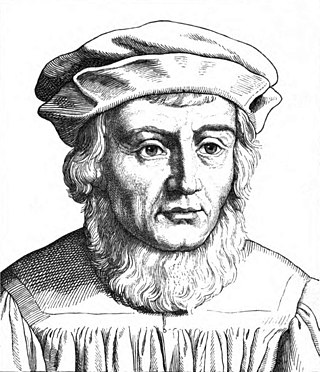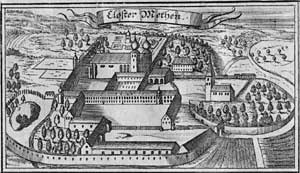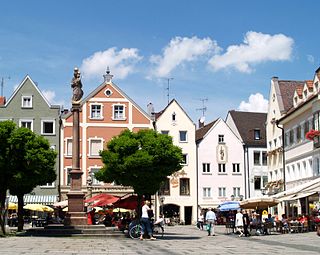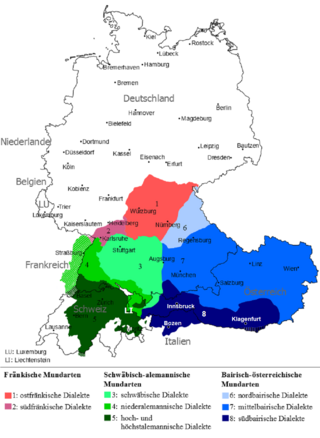Related Research Articles

Franconia is a region of Germany, characterised by its culture and Franconian dialect.

Christoph Scheiner SJ was a Jesuit priest, physicist and astronomer in Ingolstadt.

Johann Georg Turmair, known by the pen name Johannes Aventinus or Aventin, was a Bavarian Renaissance humanist historian and philologist. He authored the 1523 Annals of Bavaria, a valuable record of the early history of Germany.

Metten Abbey, or St. Michael's Abbey at Metten is a house of the Benedictine Order in Metten near Deggendorf, situated between the fringes of the Bavarian Forest and the valley of the Danube, in Bavaria in Germany.

Benediktbeuern Abbey is an institute of the Salesians of Don Bosco, originally a monastery of the Benedictine Order, in Benediktbeuern in Bavaria, near the Kochelsee, 64 km south-south-west of Munich. It is the oldest and one of the most beautiful monasteries in Upper Bavaria. It was badly damaged in an extreme weather event in 2023.

Aldersbach Abbey is a former Cistercian monastery in the community of Aldersbach in the district of Passau in the valley of the Vils, Lower Bavaria, Germany.

Weissenau Abbey was an Imperial abbey (Reichsabtei) of the Holy Roman Empire located near Ravensburg in the Swabian Circle. The abbey, a Premonstratensian monastery, was an Imperial Estate and therefore its abbot had seat and vote in the Reichstag as a prelate of the Swabian Bench. The abbey existed from 1145 until the secularisation of 1802-1803.

St. Mang's Abbey, Füssen or Füssen Abbey was a Benedictine monastery in Füssen in Bavaria, Germany. It was founded in the 9th century, and dissolved during the post-Napoleonic secularisation of Bavaria.

Weilheim in Oberbayern is a town in Germany, the capital of the district Weilheim-Schongau in the south of Bavaria. Weilheim has an old city-wall, historic houses and a museum.

Upper German is a family of High German dialects spoken primarily in the southern German-speaking area.

Ruprecht of the Palatinate was the Archbishop and Prince Elector of Cologne from 1463 to 1480.
Max Koch was a German historian and literary critic.

The Odeon is a former concert hall in the Odeonsplatz in Munich, Bavaria, Germany, which is named after it. Built in the early 19th century to a design by Leo von Klenze and forming a counterpoint to the externally identical Palais Leuchtenberg, it was rebuilt after being almost totally destroyed in World War II and now houses the Bavarian Ministry of the Interior.

Johann Georg von Lori was a Bavarian high official, lawyer and historian. He was the driving force behind the foundation of the Bavarian Academy of Sciences and Humanities in 1759.
Clemens Alois Baader, also spelled Klement Alois Baader or Klemens Alois Baader was a German Roman Catholic theologian.
Rainer Cadenbach was a German musicologist and University professor.
Heinrich Lutter was a German pianist and piano educator.

The Aldersbach brewery is a traditional medium-sized brewery in Aldersbach, Lower Bavaria, opened in the 13th century. It produces beer types such as Dunkel, Helles, and Pilsner, plus seasonal Bock and Pale lagers. In 2016, it won awards from the Bavarian Brewers Association and the Bavarian State Beer Exhibition.
The Institute of Bavarian History at the Ludwig Maximilian University (Ludwig-Maximilians-Universität) in Munich is a centre of research and teaching of Bavarian history in a European context. It is located in the building complex of the Bavarian State Archives and in the immediate vicinity of the Bavarian State Library.
Heiko Haumann is a German historian and retired academic scholar.
References
- ↑ Ladislaus Buzas: Polling und die Universitätsbibliothek Ingolstadt - Landshut - München. In: Fridolin Dreßler, Ladislaus Buzas, Hermann Wiese: Zur Geschichte der Pollinger Bibliothek, p. 26
- 1 2 Fridolin Dreßler, Ladislaus Buzas, Hermann Wiese: Zur Geschichte der Pollinger Bibliothek, p. 11
- 1 2 Max Biller: Pollinger Heimat-Lexikon, p. 135
- ↑ Gemeinde Polling: Bibliothekssaal, retrieved: 28 January 2015
- ↑ Max Biller: Pollinger Heimat-Lexikon, p. 137
- ↑ Max Biller: Pollinger Heimat-Lexikon, pp 137–138
- ↑ Max Biller: Pollinger Heimat-Lexikon, pp 139–140